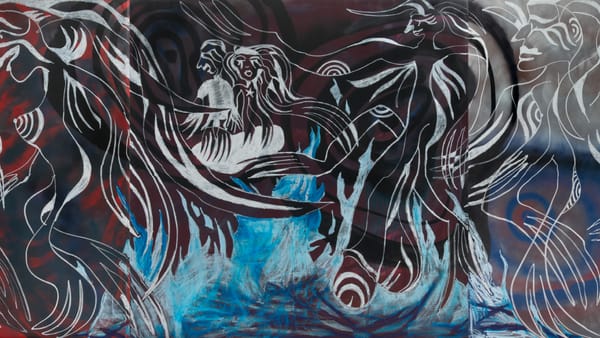The Poetry of Psychoanalysis
Jasmine Gibson’s training as a psychoanalyst seems to permeate the organization of her poems’ imagery.

Carl Jung once criticized Freud for applying the concept of “sex” to so many things that it ceased to have definitive meaning. For Freud, however, this was exactly the point: the “sexual” could be more than what Victorian morality designated as such and not everything considered sex was sensual. In a rejuvenated fashion, the specter of creative indeterminacy haunts Don’t Let Them See Me Like This, the debut collection of poet and psychotherapist Jasmine Gibson. Gibson’s training as a psychotherapist seems to permeate the organization of her poems’ imagery. Echoing Anti-Oedipus, the seminal 1972 text by Gilles Deleuze and Félix Guattari, while also mindful of the more secretive, expressive forms of communication specific to psychoanalysis, desire presents itself in her work as a conatus everywhere falsified by the logic of capital, and the moralistic imperative of drudgery it presupposes.
Gibson’s primary theme is sex — or, more precisely, interpersonal relationships mediated by desire. While not a commodity in itself, sex can be commodified. It is also racialized and gendered; it explodes the discursive logic of rational understanding, flouting the ontological principle of identity (as in “A=A”). The characters in her poems — whose motives are thinly sheltered by reference to an “I” or a “you” — never quite coincide with who and how they fuck. Though they try to recover and knowingly possess their experience of sex, the particulars of various encounters dissolve into discontinuity:
that bed that is not your own
it only gets that way when I’m alone
day dreaming of marches and
imagining meeting you in the South, where it’d have been
more kinky to be doing how I do now in the North and who it with
but this time with the lights on
flood lights, I like the way my pupils spread
under them and I can feel myself opening up (from “Oxblood”)

Gibson’s poems often communicate a dreamlike indeterminacy. Her lines can usually be read both forwards and backwards, without detriment to the poem’s meaning. For example:
I tried to cry and nothing came out
I cried when I came instead
it’s nothing but cum
whilst the lord is by your side
and I can’t because it doesn’t work that way
I’ve tried to find you in the reflection of a puddle
In the ripped cartridges of yellow American spirits
In the pickling of my liver
None of those things were your style” (from “Schatzen”)
Coherence moves in either direction, which in a sense “neutralizes” the poem’s imagery. On one level, these lines speaks to the inconclusiveness of any totalizing understanding of our co-existence with others; on another level, and more affirmatively, Gibson’s use of indeterminacy blights out the limitations imposed on a life lived at the margins of the economy. Carried forward by easy, vocable rhythms the reader/listener can enter into the temporality of the poem, a fluxional unfolding that loosens the linearity customarily imposed on experience, as well as on entire classes of people and objects:
I don’t want to grovel paycheck to paycheck
I don’t want to mutter under my breath when pigs show up at my workplace
I want to burn
I want everyone to know how alcohol feels when it’s lit
what it’s like to play with fire
I want us to burn today and tomorrow” (from “Drapetomania”)
It’s essential to Gibson’s poetics that one line cannot stand in isolation; it requires the surrounding context of the lines before and after it to become clear. This mimics collectivism rather than individualism. Her poems are meant to be spoken — perhaps most meaningfully to small, responsive groups, who are aware that in the ahistorical, everyday-ness of life under capital our ends are as unknown as our origins. What’s simply real is the flux of the present moment, what it struggles to reveal, and the traumas that compose its warp and woof.
Don’t Let Them See Me Like This by Jasmine Gibson (2018) is published by Nightboat Books and is available from Amazon and other online retailers.




